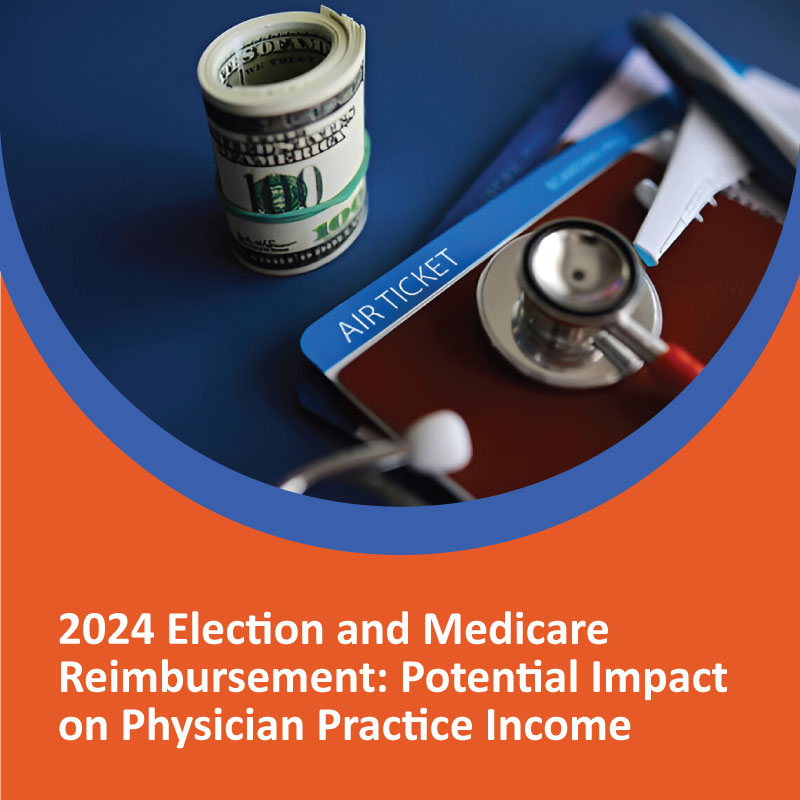The 2024 election is shaping up to be a pivotal moment for healthcare in the United States. Among the many issues on the ballot, Medicare reimbursement stands out as a subject of significant importance. For physicians, modifications to Medicare policies could significantly effect practice income, making it important to understand what’s at stake.
The Intersection of Elections and Healthcare Policy
How Elections Shape Medicare Policies
Medicare, the federal health insurance program for seniors and individuals with disabilities, is deeply intertwined with politics. Election outcomes often dictate the direction of Medicare policies, influencing everything from coverage expansions to payment models. Historically, shifts in political power have led to significant changes, such as the introduction of value-based care or adjustments to payment rates.
Medicare Reimbursement: A Key Concern
Medicare reimbursement refers back to the payments healthcare providers acquire for treating Medicare patients. These payments are a first-rate supply of income for plenty of practices. Even small modifications in reimbursement rates will have a ripple effect, influencing the financial health of practices and the quality of care provided.
Medicare Policy Changes 2024
Proposed Changes to Medicare Payment Models
In 2024, discussions around Medicare payment models are heating up. One of the key proposals is a shift toward value-based care, where providers are rewarded for quality rather than quantity. Additionally, adjustments to the traditional fee-for-service model are being considered, potentially affecting how practices bill and earn.
Reimbursement Trends to Watch
Emerging trends in 2024 include increased emphasis on preventive care and integrated care models. Comparing these trends to previous years, there’s a clear push toward cost-efficiency while maintaining patient outcomes.
Impact of Election on Medicare
Political Party Stances on Healthcare
Healthcare remains a divisive issue between political parties. While one party might advocate for expanding Medicare coverage and increasing reimbursements, another could push for budget cuts and stricter regulations. Understanding these platforms helps predict potential changes.
Legislative Outcomes and Their Effects
The legislative landscape post-election will play a crucial role in shaping Medicare policies. Key decisions on reimbursement rates and healthcare funding could either bolster or challenge physician practices.
Physician Practice Income in 2024
Role of Medicare Reimbursement
Medicare repayment directly affects health practitioner exercise profits, specially for the ones serving a massive Medicare populace. Fluctuations in payment prices can determine the sustainability of sure offerings or specialties.
Other Economic Influences
Beyond Medicare, factors like inflation, operational costs, and patient volumes also influence practice income. In 2024, physicians must navigate these challenges alongside policy shifts.
Challenges Physicians May Face
Financial Uncertainty During Election Years
Election years often bring financial uncertainty. Delays in budget approvals or policy changes can disrupt reimbursement timelines, straining practice finances.
Adapting to Medicare Policy Changes
Medicare policy changes require quick adaptation. Practices must be ready to modify billing systems, staff training, and service delivery to align with new regulations.
Strategies for Navigating 2024 Changes
Staying Updated on Policy Changes
Keeping up with Medicare regulations is crucial. Physicians can rely on resources like the Centers for Medicare & Medicaid Services (CMS) website, industry journals, and professional associations to stay informed.
Optimizing Practice Operations
To offset potential income disruptions, practices should focus on efficiency. Streamlining billing processes, reducing overhead costs, and embracing telehealth are effective strategies.
The Future of Medicare Reimbursement
Potential Long-term Trends
Looking beyond 2024, Medicare reimbursement may continue to evolve toward integrated care models and value-based systems. These trends highlight the need for adaptability in practice management.
Balancing Cost and Care Quality
While cost containment is a priority, maintaining high-quality care remains essential. Striking this balance will define the success of future Medicare policies.
Conclusion
The 2024 election is a turning factor for Medicare reimbursement and physician practice income. With potential policy adjustments on the horizon, staying informed and proactive is the best way for physicians to navigate this uncertain panorama. By getting ready now, practices can position themselves for fulfillment irrespective of the election’s outcome.
Frequently Asked Questions
What is Medicare reimbursement?
Medicare reimbursement is the payment healthcare carriers get hold of for treating patients covered by Medicare.
How does the 2024 election impact Medicare policies?
The election could lead to policy changes affecting reimbursement rates, payment models, and healthcare funding.
What are the proposed changes to Medicare reimbursement in 2024?
Key proposals include adjustments to fee-for-service models and a stronger emphasis on value-based care.
How can physicians prepare for these changes?
Physicians can stay updated on policy changes, optimize their operations, and plan financially for potential shifts.
Why is Medicare reimbursement important for physician practice income?
It’s a significant revenue source, particularly for practices serving a high number of Medicare patients.



